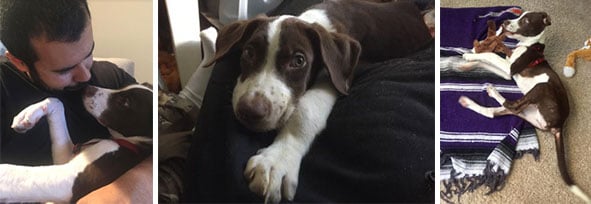Where Are They Now? Catching Up With Hurricane Maria’s Canine Refugees
When Hurricane Maria slammed into Puerto Rico in 2017, it left an unprecedented trail of destruction in its wake—it swamped homes, shredded roofs, tossed trees around like matchsticks, blocked roads, and knocked out power and water supplies to millions of people. For over a week, there were no commercial flights and no boats willing to take passengers onto the island. So, PETA pulled out all the stops and—thanks to a member’s generosity—chartered a plane to Puerto Rico as soon as authorities allowed us entry.
Our rescue team hit the ground running, plucking traumatized and injured animals out of abandoned homes and devastated neighborhoods and transporting them to veterinary clinics for care. We delivered pet food and other supplies, and we helped clear trees and clean up the mess left behind by 155-mph winds and a 9-foot storm surge. We also assisted severely overburdened animal shelters with recovery efforts—repairing damaged structures, cleaning cages and kennels, walking dogs, and giving fresh food and water to hundreds of animals.
After spending two weeks on the ground in Puerto Rico, our team identified 11 of the most vulnerable dogs and brought them back to Virginia for additional veterinary care and a chance at adoption.
Take a look at some of their uplifting stories, but beware—they’ll take your heart by storm.
Pedro
When we found Pedro cowering in a storm-battered animal shelter, the frightened puppy’s leg was swollen to three times its normal size because of an untreated injury that was sustained when he was just a few weeks old. PETA’s team rushed him to a local veterinarian for immediate treatment, which continued after he was adopted by a former PETA staffer. According to his new guardian, you would never guess that he once had a useless leg when you watch him bound after tennis balls and lead the pack in laps around the dog park.

Dolly
PETA’s team found Dolly huddled against the back of a small, filthy cage, where she’d lived for more than seven years. We took her to a veterinarian, who diagnosed her with hookworms and ehrlichiosis, a bacterial infection that can cause weakness, difficulty breathing, loss of appetite, and worse. A member of our rescue team fell for the sweet, shy dog and took Dolly home with her. Although timid and apprehensive at first, she soon bonded with her new guardian—and her new canine and rabbit siblings.

Chiquita
PETA’s team noted right away that Chiquita is as sweet as banana pudding. After arriving in Virginia, she was transferred to the Virginia Beach SPCA, where she was quickly adopted. Here’s what her new family says about her:
“[She] is the most amazing pup. … [W]e absolutely love her and so does every person that meets her. She loves them back just as much, adults and children both.”
Stephen
Don’t let Stephen’s small size fool you—his personality is 10 feet tall. As soon as he saw our team approaching the animal shelter, he ran up to the gate with all the big dogs, despite the very real danger of being trampled by large paws! Upon arriving at PETA’s Norfolk, Virginia, headquarters, he was adopted almost immediately. He now has a canine sister named Nana, whom he loves to follow around and try to cuddle with. Although he doesn’t have any fur on his back—which we suspect is because of scarring from prolonged exposure to the hot Puerto Rico sun—his skin has improved immensely, thanks to lots of soothing oatmeal baths.

Portero
Portero—meaning “gatekeeper” in Spanish—got his name because he was always at the shelter’s gate, hoping against hope that someone would take him home. While the source of his name is heartbreaking, there’s nothing sad about his new life with a member of PETA’s rescue team. According to his guardian, Portero is the perfect friend. He is up for any adventure, from hiking in the mountains to zooming up and down the beach—or simply cuddling in bed (admittedly his favorite activity of all). Have a free hand? Make sure it’s petting him. As if his success story weren’t enough, his canine sister, Edith, has an uplifting story of her own.

How You Can Help Animals in Times of Crisis
Support for PETA’s Animal Emergency Fund makes it possible for us to respond quickly when disasters like Hurricane Maria put animals in danger. Click the button to learn more about making a donation today:


